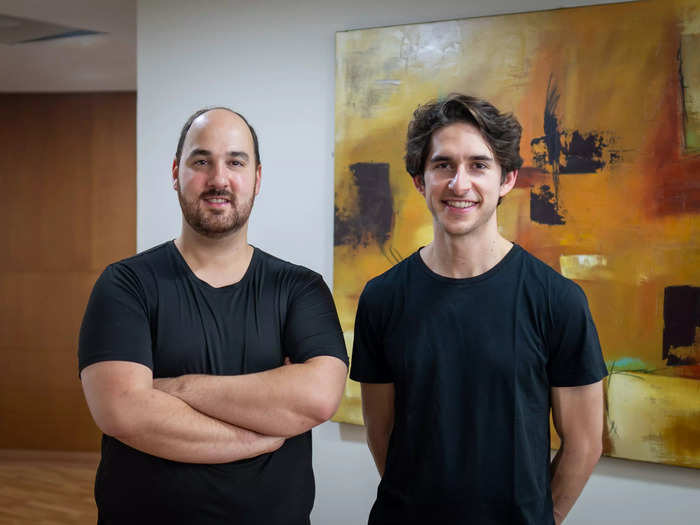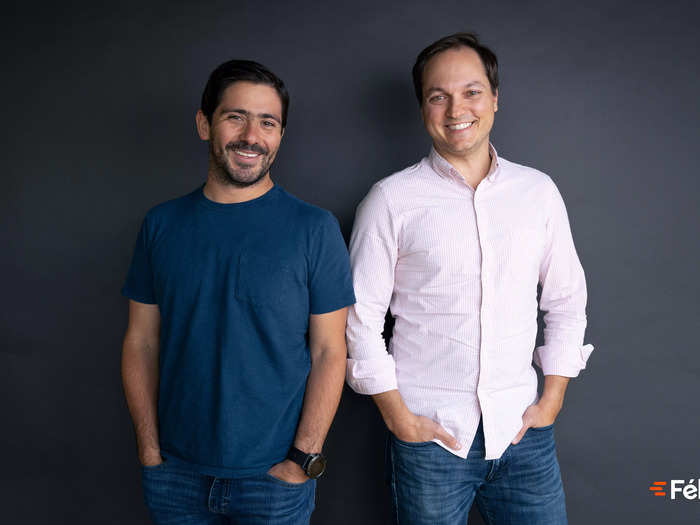Here are 49 of the most promising fintech startups transforming how we bank, invest, work, and pay, according to 27 top investors
Bianca Chan,Michelle Abrego,Samantha Stokes,Sri Muppidi,Ben Bergman,Melia Robinson,Vishal Persaud

- Business Insider asked 27 venture-capital investors to nominate the most promising fintechs.
- VCs highlighted startups that haven't raised beyond a Series C.
They say pressure makes diamonds. VCs are probably hoping the same is true for startups launching and operating in this tough economy.
Fintech funding, measured across average deal size and deal volume, fell from 2023 levels, according to CB Insights' second-quarter State of Fintech report.
Still, VCs are finding bright spots in the sector. Business Insider asked 27 top investors — including Index Ventures, QED Investors, and Bain Capital Ventures — to name some of those diamonds in the rough. In total, they named 49 red-hot startups that haven't raised beyond a Series C, including companies within their portfolios and those with which they have no financial ties.
AI fintechs dominated the series this year, using the tech to do everything from helping dealmakers negotiate debt agreements to automating compliance for fintechs and banks, and helping consumers strategize around their debts. Fintechs disrupting the insurance and healthcare industries were also popular. And some VCs are excited about startups using crypto's behind-the-scenes tech, like stablecoins and blockchain, to streamline money movement.
Check out the 49 startups identified as most promising by 27 top investors.Albert

Cited by: CapitalG (investor)
Total raised: $225 million, as of 2023
What it does: Albert is a personal-finance app for consumers that includes saving, budgeting, and investing tools.
Why it's on the list: "Albert's financial wellness app grants every American access to the financial tools and advice that have traditionally only been made available to people with wealth managers," Kelly Barton, a vice president on the CapitalG investment team, said. "Spanning budgeting to identity protection to investing, Albert's mission is to equip their users with financial advice, data, and automation so that all consumers have the ability to make informed financial decisions."
Aleph

Cited by: Bain Capital Ventures (investor)
Total raised: $16.7 million
What it does: Aleph is a corporate financial-planning and analysis tool that consolidates all financial data across different systems so users can perform better analyses.
Why it's on the list: "The product is built for a technical finance leader who loves the flexibility and familiarity of Excel and Google Sheets, but needs critical data integrations and automations as the complexity of their business scales," Kevin Zhang, a managing director at Bain Capital Ventures, said.
"Any customer who uses Aleph during the trial has an 'aha' moment immediately; unlike most FP&A tools on markets, this keeps finance leaders in the format and products they know and love, while supercharging their workflows. They have immense customer love and have signed impressive logos like Zapier, Notion, Webflow, Turo, Figma, and more," Zhang added.
Allium

Cited by: Theory Ventures (investor)
Total raised: $21.5 million
What it does: Allium provides blockchain data for companies.
Why it's on the list: "Allium offers quick and simple enterprise-grade blockchain data for leading institutions and companies like Visa, Stripe, Uniswap Foundation, and Phantom," Tomasz Tunguz, a general partner at Theory Ventures, said. The startup's suite of data products covers more than 40 blockchains and more than 100 schemas, or blueprints for how data is organized, which "delivers high-quality blockchain data wherever and however customers need it," Tunguz added.
Anatomy

Cited by: Flourish Ventures
Total raised: $7.6 million
What it does: Anatomy is building a financial operating system for healthcare providers.
Why it's on the list: "Healthcare, a $4 trillion industry, struggles with generic financial solutions that ignore its unique needs, leading to costly inefficiencies like manual data entry and high processing fees. Anatomy is revolutionizing this space with tailored, embedded financial products that streamline outdated billing and reconciliation practices," Emmalyn Shaw, the cofounder and managing partner of Flourish Ventures, said.
"Led by seasoned entrepreneurs from both financial services and healthcare, Anatomy is the ideal team to seize this complex and critical market opportunity," Shaw said.
Anrok

Cited by: Accel
Total raised: $54 million
What it does: Anrok is building a sales-tax solution for software-as-a-service businesses.
Why it's on the list: "Anrok is following the classic API playbook; abstracting away a surprisingly complex yet necessary piece of infrastructure into its own layer and making it about as developer and user-friendly as possible," Amit Kumar, a partner at Accel, said. "They're still working their way up the complexity curve to handle all the long-tail scenarios, but the progress they've made is impressive, as indicated by the consistently positive feedback I hear about them from founders and developers in my network."
Archway Software

Cited by: Madrona Venture Group (investor)
Total raised: $15 million
What it does: Archway Software builds software for regional and community banking institutions.
Why it's on the list: "These institutions face challenges including eliminating customer friction, reducing operating costs, and preventing fraud, but are burdened with legacy technology and single-purpose solutions," Chris Picardo, a partner at Madrona Venture Group, said of regional and community banks.
"Spun out of a leading regional bank, Archway Software enables regional and community banks to accelerate their digital evolution with state-of-the-art user experiences on both web and mobile platforms. Archway's approach has received many awards and partners with major cloud providers," he added.
Authentic

Cited by: Inspired Capital
Total raised: $16 million
What it does: Authentic enables businesses to easily launch and manage their own insurance programs instead of buying insurance from a broker or carrier to create new revenue streams, tailor coverage, and lower insurance premiums.
Why it's on the list: "This approach is compelling to companies because it dramatically reduces the complexity of setting this up while increasing customer retention and generating significant revenue," Alexa von Tobel, the founder and managing partner at Inspired Capital, said.
Baseline

Cited by: Portage
Total raised: $1.6 million
What it does: Baseline builds software for landlords offering loan origination, loan servicing, investor management, and borrower-facing point-of-sale technology.
Why it's on the list: Baseline is a "really interesting company doing vertical SaaS for landlords — and monetizing via banking and payments," said Stephanie Choo, a general partner at Portage, adding that it's "really taking off now."
BeatBread

Cited by: Deciens Capital (investor)
Total raised: More than $150 million
What it does: BeatBread uses advanced machine learning to analyze and predict revenue potential for the music industry, providing funding advances to a broad range of artists.
Why it's on the list: "Artists of all sizes want independence and ownership over their music, to work with their preferred partners, and to control their own destinies. Historically, there hasn't been a real alternative to the major label advance for artists to get the capital they needed to scale their careers, which locks them into the label ecosystem," Dan Kimerling, the managing partner at Deciens Capital, said.
"2024 has been a pivotal year for BeatBread, marked by strategic moves and partnerships that further solidify its mission," Kimerling said, referring to its partnerships with the administrative publishing company Kobalt and its subsidiary AMRA to offer artists increased royalties and faster payments. Other strategic moves include a series of deals providing funding to independent labels to expand how BeatBread provides capital to artists.
Brale

Cited by: The Fintech Fund
Total raised: $11.1 million
What it does: Brale removes the technical, regulatory, and operational complexity to issue a stablecoin.
Why it's on the list: "Stables make it easier to pay people quickly, cheaply, and in a programmable way. Many companies are attacking different parts of the stablecoin value chain," Nik Milanovic, a general partner at The Fintech Fund, said, referring to use cases that convert stablecoins to dollars and other fiat currencies and embedding stablecoins in product flows, such as PayPal's PYUSD.
"But what Brale does is unique, brilliant, and different," Milanovic said about Brale enabling users to create their own stablecoin in about two minutes, pending compliance approval. "While some users launch their own stablecoins to offer to their end customers, many just issue their own programmable stablecoin in order to improve their own internal payment flows," he said.
Brico

Cited by: TTV Capital, Homebrew
Total funding: $8.1 million
What it does: Brico helps financial institutions and fintechs manage their licensing by using automation to simplify applications and renewals.
Why it's on the list: "With Brico, businesses can effortlessly navigate the complexities of acquiring, renewing, and managing compliance for various financial licenses — including Credit, Money Transmitter, Mortgage Loan Originator, and more — in all 50 states," Lizzie Guynn, a partner at TTV Capital, said. "Brico makes regulatory compliance seamless and cost-effective with its user-friendly tools that reduce time and money spent on financial licenses."
"It's addressing a very manual and expensive process that nearly every financial services company needs to deal with on an annual basis," Satya Patel, a partner at Homebrew, said.
Cable

Cited by: Commerce Ventures
Total raised: $16.3 million
What it does: Cable offers automated compliance software.
Why it's on the list: "The financial system is more intertwined than ever. With these complicated multi-stakeholder relationships, it becomes that much more important to have a strong and effective compliance program." Dan Rosen, a partner at Commerce Ventures, said. "The team at Cable offers fintechs and their incumbent financial services partners a best-in-class workflow and collaboration platform for program compliance monitoring."
"The team has two female cofounders to boot," Rosen added. "Natasha and Katie are absolute experts in the area of financial-crime management, having managed financial-crime prevention for unicorn neobank Monzo, as well as holding risk leadership roles for Square in Europe. They are already seeing exciting momentum in an important area of fintech."
Capitalize

Cited by: Everywhere Ventures
Total raised: $33.5 million
What it does: Capitalize helps people roll over their old 401ks efficiently and without a cost.
Why it's on the list: "I finally got frustrated receiving so many statements and trying to keep track of all my old 401ks so I decided to roll them over. Not so easy it turns out! I came across Capitalize and was excited to see that I could outsource the hassle. I appreciated that it was free and fast and now I have all my accounts in one place," Jenny Fielding, cofounder and managing partner at Everywhere Ventures, said.
"For many years, financial institutions held customers hostage because the paperwork and time it took to change accounts or consolidate just didn't seem worth it," she added. "But now, with APIs and AI, a lot of the tedious work can be automated away, providing more functionality and choice for consumers."
Cascading AI

Cited by: QED Investors, Vesey Ventures
Total raised: $4.1 million
What it does: Cascading AI, through its main product Casca, offers loan-origination software for the banking sector with an integrated AI assistant that allows firms to extend their hours.
Why it's on the list: "Customers do not operate on the 9-to-5, Monday-to-Friday schedules that banks do," Laura Bock, a partner at QED Investors, said. "When a pizzeria's oven breaks, the owner is inquiring about a loan after closing shop. While today, it might take nearly three days to hear back from a loan officer after submitting an application, financial institutions using Casca's AI platform are able to unlock 24/7, 365 support for current and potential customers."
Dana Eli-Lorch, a founding partner at Vesey Ventures, said: "Their flagship product, an AI-powered loan assistant, enables manifold increases to banks' productivity and loan conversion rates, all while enhancing both accuracy and applicant experience. Casca exemplifies the powerful impact AI can have on financial services, driving significant operational efficiency and customer satisfaction."
Clerkie

Cited by: Flourish Ventures (investor)
Total raised: $41 million
What it does: Clerkie embeds its AI debt-automation software in financial institutions' mobile apps, allowing consumers to make financial decisions about their debts and discover solutions if they're struggling to pay them off.
Why it's on the list: "Clerkie's data flywheel and network create a win-win scenario for both consumers and financial institutions. Consumers enjoy a seamless experience within their banking app, with flexible solutions tailored to their specific cash flow needs, helping them avoid the collections process and protect their credit scores. Banks benefit from direct ROI through loan repayment while maintaining customer relationships," while also expanding loan-to-value ratios, Flourish Ventures' Emmalyn Shaw said.
She added that "Clerkie assumes no balance-sheet risk, serving as the debt-network and debt-payment infrastructure for financial institutions."
Coast

Cited by: Accel (investor)
Total raised: $165 million
What it does: Coast offers companies operating a fleet of vehicles — such as plumbers, school bus companies, and landscapers — a corporate card for drivers to buy fuel designed to mitigate fraudulent purchases. It also provides a platform for business owners or managers to manage their entire fleet and corporate expenses at a glance with greater ease, visibility, and control.
Why it's on the list: Accel's Amit Kumar said Coast's founder and CEO Daniel Simon "is a seasoned, repeat entrepreneur with deep fintech experience."
"His thesis of building the next-gen fleet card is playing out; by building atop a modern payments stack, he and the team have produced a flexible, reliable fleet card, which has already won over thousands of customers and brought together a coalition of partners across the fintech and fleet ecosystem who are just as invested in the open-loop model," Kumar said.
Comulate

Cited by: Pathlight Ventures (formerly Exponent Founders Capital)
Total raised: About $5 million
What it does: Comulate automates insurance statement processing, reconciliation, revenue recovery, and forecasting.
Why it's on the list: "Leveraging AI to drive real revenue lift for insurance carriers is driving success in a category" that's historically been hard to break into, Charley Ma, a cofounder and managing partner of Pathlight Ventures, said.
Comun

Cited by: Redpoint Ventures (investor)
Total raised: $32 million
What it does: Comun is building a financial hub for Latino immigrants in the US, offering banking, debt, and remittance services.
Why it's on the list: "With a population of 64 million and $3.4 trillion in spending power, powering Latinos' finances is a huge opportunity — yet close to 30% of Latinos are unbanked or underbanked due to the high fees and high friction in accessing these services," Meera Clark, a principal at Redpoint Ventures, said. "Thanks to Comun's impressive ex-Brex and Nubank tech chops and underlying technical sophistication, it is able to offer the cheapest and most accessible banking, debit, and remittance services on the market today."
Confido

Cited by: The Fintech Fund (investor)
Total raised: $3.5 million
What it does: Confido is a financial-planning and analysis tool for retail brands that processes payments, categorizes deductions, forecasts sales, and tracks spending in a single platform.
Why it's on the list: For retail brands and consumer packaged-goods companies generating more than $50 million in sales, "it's difficult to track revenue across all of your channels," The Fintech Fund's Nik Milanovic said, adding that retail companies typically hire CFOs and entire accounting teams to do simple tasks like reporting, booking refunds and returns, and cashflow forecasting.
"Confido does this automatically by pulling all of the information that consumer-facing product companies need into one place, and then generating automated reports with insights. They sync with all the accounting systems that brands are already using, which has helped them grow really quickly. The future product will include more financial options and tailored recommendations as well," he said.
Coris

Cited by: Pathlight Ventures (investor)
Total raised: $3.7 million
What it does: Coris builds software for fintechs and other tech companies to manage risk and fraud among small- and medium-size business clients.
Why it's on the list: "Aggregating unstructured data on SMBs to generate insights at scale is challenging. Coris is at the forefront, leveraging a variety of methods across LLMs, ML, and good old-fashioned software to establish itself as the leading platform for managing SMB risk and fraud — already working with clients like Mindbody and ClassPass," Pathlight's Charley Ma said.
Felix Pago

Cited by: Harlem Capital
Total raised: $24 million
What it does: Felix facilitates cross-border payments, focusing on remittances from US workers sending money to families and friends in Latin America.
Why it's on the list: "Felix Pago has been impressive in how they've reached early success, especially in distribution which can be one of the most challenging areas for a startup to tackle," Gabby Cazeau, a partner at Harlem Capital, said. "They built a chatbot on WhatsApp to reach users already in and from LatAm. This brings natural familiarity with the product and the potential for high virality with users."
"Remittances are also a huge business, and traditional providers take large fees that cut into how much money people can send to each other," she added. "Felix is built on the blockchain and uses stablecoins, which allows them to save on FX fees and which they can pass to users."
Finally

Cited by: Fiat Ventures
Total raised: $309 million
What it does: Finally offers a suite of tools to streamline accounting needs for small- and medium-size businesses, including bookkeeping, payroll, taxes, cash flow, and expense management.
Why it's on the list: "Finally has had incredible traction, growth, and product development. Amazing founders that have continued to bring on A+ leaders to their team, market-leading capital partners, and are poised for meteoric growth in the coming 24 months to become the leader in their space," Marcos Fernandez, the cofounder and managing partner of Fiat Ventures, said. "The opportunity to provide a full-stack solution for the millions of SMBs in the United States gives Finally a clear path to becoming a Decacorn in the coming years."
Finix

Cited by: Homebrew (investor)
Total raised: $133 million
What it does: Finix offers businesses a payments-processing platform that lets them accept and manage payments.
Why it's on the list: "The company is exciting because it has the best low code, no code solution for enterprises who don't have vast technical resources but have complex payments needs," Homebrew's Satya Patel said. "It's going after a massive segment of the market that has been poorly served by expensive and inflexible legacy solutions and underserved by API-only solutions."
Fintary

Cited by: Harlem Capital (investor)
Total raised: $2.5 million
What it does: Fintary helps insurance companies manage their finance and accounting needs by automating workflows.
Why it's on the list: "They have been invited to their customers' conferences in order to share the product with their customers' customers," Henri Pierre-Jacques, the cofounder and managing partner of Harlem Capital, said. He said Fintary has grown more than 10 times since Harlem's investment last fall, adding that "the quick ramp has been one of the fastest we've seen for a preseed company."
Flex

Cited by: Hustle Fund (investor)
Total raised: $135 million
What it does: Flex is a finance app for SMBs and middle-market companies.
Why it's on the list: "Flex elegantly unifies banking, payments, and expense management for businesses. It is one of the financial institutions that have been aggressively expanding their lending operations," Eric Bahn, the cofounder and a general partner at Hustle Fund, said.
Unlike competitors in this space, such as Brex and Ramp, "this team has raised far less capital, yet still has expanded into huge revenue quietly," he said, declining to disclose the exact amount. "Flex is going to underwrite so many great startups and companies as their financial backend in the coming years."
Footprint

Cited by: QED Investors (investor)
Total raised: $20 million
What it does: Footprint enables businesses to increase onboarding conversion while ensuring compliance and reducing fraud.
Why it's on the list: "Historically, businesses had a choice — increase conversion and increase fraud, or decrease fraud and decrease conversion. Footprint breaks this dichotomy. They do this by integrating KYC, Auth, and Vaulting, all uniquely complex technologies, allowing them to create magical experiences for users while increasing revenue for their customers," Adams Conrad, a principal at QED Investors, said. "At scale, this will enable a centralized database of portable identity for people to dramatically decrease fraud and friction across the internet."
Forward

Cited by: Commerce Ventures (investor)
Total raised: $16 million
What it does: Forward manages payment authorization, settles transactions, moves money, and handles reconciliation for other companies.
Why it's on the list: "We completed an extensive review of next-generation players enabling payment acceptance to be embedded successfully in software experiences (e.g., booking platforms, e-commerce enablers, team sports applications). From this analysis, we saw Forward as a standout player in terms of highly relevant team experience and an approach that would maximize the success of clients and a technology platform that supported this approach for clients at a wide variety of size and scale," Dan Rosen, a general partner at Commerce Ventures, said.
"Brandon, Derek, and Danielle are veteran payments and commerce operators with a track record of building new platforms and bringing them to market directly and through large partnerships. We're delighted to be able to work with them," he said of the cofounders, Brandon Lloyd, Derek Victory, and Danielle Madison.
Found

Cited by: Lightspeed Ventures (investor)
Total raised: $119 million
What it does: Found provides banking and accounting services for self-employed workers, like freelancers and contractors.
Why it's on the list: "Combining banking services with tax, bookkeeping, and invoicing in a single platform has real power for the end user. For the first time, self-employed businesses get for free a service that they'd otherwise pay third parties thousands of dollars to reproduce. We've invested multiple times in Found due to its incredible value proposition and customer love," said Lightspeed Ventures Partner Alex Taussig.
GlossGenius

Cited by: CapitalG
Total raised: $78.7 million
What it does: GlossGenius offers payments and accounting software built for the beauty and wellness industry.
Why it's on the list: "The company's platform enables spas and salons of all sizes to offer an exceptional customer experience and drive efficiency in their operations, transforming many manual back-office processes into a seamless workflow. GlossGenius' tech stands out from competition as a result of their deep understanding of what the industry needs, stemming from founder experience managing a makeup artistry business and living firsthand how underserved this market was from technology," Kelly Barton, the vice president at CapitalG, said.
Here's the pitch deck GlossGenius used to raise its Series A.
Greenlite

Cited by: Greylock (investor)
Total raised: $4.8 million
What it does: Greenlite automates compliance processes using AI for fintechs and banks.
Why it's on the list: "Greenlite has seen exceptional customer demands with enterprise banks and fintechs and has proven one of the few enterprise-grade applications for generative AI — automating tedious compliance workflows like alert handling, periodic reviews, and document processing, improving efficiency and reducing human error," Seth Rosenberg, a general partner at Greylock, said.
Hypercard

Cited by: Interplay
Total raised: $15.5 million
What it does: Hypercard is building a hybrid buisness and personal credit card issued by employers through the American Express network that also streamlines expense management.
Why it's on the list: "Hypercard is run by a team of young, driven entrepreneurs that have set out to completely change the way employers manage and incentivize their employees. Already, in the very early innings of building this company, the team secured invaluable partnerships with industry leaders such as Amex and SAP Concur to create an industry-leading product," Mark Peter Davis, a managing partner at Interplay, said.
Iris Finance

Cited by: Redpoint Ventures
Total raised: $3.5 million
What it does: Iris Finance offers consumer-facing companies AI-powered financial planning and analysis software.
Why it's on the list: "While the notion of AI bookkeeping is very much in vogue today, replacing Quickbooks is hard — and not something most brands or outsourced accountants are looking to do in the near term," Redpoint's Clark said. "Iris, instead, complements Quickbooks with a more holistic AI-powered CFO-in-a-box for brands, enabling them to seamlessly track and improve day-to-day sales and margin performance across channels, which much more closely aligns with what founders want and how modern brands are managed."
Kanmon

Cited by: Inspired Capital (investor)
Total raised: $13 million
What it does: Kanmon helps software companies embed financial products for their clients.
Why it's on the list: "As embedded fintech continues to scale, Kanmon is front and center in embedded lending, reimagining the future of how SMBs access capital. We're super excited about the founding team who brings entire careers' worth of credit experience from places like LendUp, Mission Lane, and Funding Circle," Inspired Capital's Alexa von Tobel said.
Kikoff

Cited by: Portage (investor)
Total raised: $42.5 million
What it does: Kikoff partners with credit bureaus to help people build their credit scores.
Why it's on the list: "They are growing incredibly quickly," said Portage's Choo, adding that Kikoff has nearly tripled its revenue year over year. She said the startup is "profitable, having raised very little."
Materia AI

Cited by: Bain Capital Ventures
Total raised: $6.3 million
What it does: Materia AI helps accountants organize their data, enabling them to automate parts of their work.
Why it's on the list: "With a decline in new auditors and an immense volume of manual data entry, professional-service audits are the perfect place for an AI copilot," Alysaa Co, principal at Bain Capital Ventures, said. "LLMs enable the automation of work like ingesting large sets of unstructured financial data, searchability, comparing against historicals and across the industry, and direct citations for where the data comes from."
Nilus

Cited by: Vesey Ventures (investor)
Total raised: $8.6 million
What it does: Nilus offers an AI-powered cash and treasury management platform for fintechs, financial firms, marketplaces, and other companies moving money.
Why it's on the list: Nilus "provides better data connectivity combined with AI to transform the CFO suite: a trend we are actively investing behind," Lindsay Fitzgerald, a general partner and the cofounder of Vesey Ventures, said.
"With Nilus, treasurers can skip the manual reconciliation work that previously took most of their day and focus on actions that can drive bottom-line impact. We think Nilus is poised to become the default software for modern treasury teams, displacing decades-old workflow tools like Kyriba and GTreasury," she said.
Noetica

Cited by: Avid Ventures, Index Ventures
Total raised: $7.85 million
What it does: Noetica helps deal professionals negotiate debit agreements with their data using an AI platform that benchmarks terms in corporate debt transactions.
Why it's on the list: "Noetica is a capital-markets data company for corporate debt, a market valued at trillions of dollars. Its AI-powered software allows professionals to upload any credit or bond document and compare all terms to similar public and private deals," Jahanvi Sardana, a partner at Index Ventures, said.
"Corporate debt terms are time-consuming and difficult to benchmark, leading deal professionals, such as lawyers and investment managers, to often miss higher-risk terms, as well as opportunities for negotiation. By building the largest proprietary dataset of corporate debt terms, Noetica is changing how these deals are negotiated and transacted," Tali Miller, a founding investor at Avid Ventures, said.
Novella

Cited by: Avid Ventures (investor)
Total raised: $2.5 million
What it does: Novella is an AI-powered insurance wholesaler specializing in excess and surplus insurance, which addresses higher-risk situations that standard carriers don't usually cover.
Why it's on the list: "Given the complexity of E&S insurance, it is sold through wholesalers who have relationships with specialty carriers, and retail brokers must work with these wholesalers to access these carriers. However, brokers have been frustrated by the leading wholesalers such as Ryan Specialty, Amwins, and CRC Group, whose lack of technology and system integrations lead to slow, inefficient, and opaque quoting processes," Avid Ventures' Tali Miller said.
"The E&S market continues to grow," Miller said, adding that E&S direct premiums written in the US climbed to more than $86 billion in 2023, more than doubling since 2018.
"Using data and AI, Novella aims to reinvent this massive industry by making the information transfer between brokers and carriers fast and error-free and, ultimately, automating quote creation," she added.
Per Diem

Cited by: Two Sigma Ventures (investor)
Total raised: $4.3 million
What it does: Per Diem is building a mobile app for small- and medium-size businesses, offering software that handles payments and tracks loyalty rewards.
Why it's on the list: "If Starbucks were a bank, its deposit amount would surpass that of 90% of the institutions under the US FDIC's coverage. And with three in 10 orders made through their app, it's become one of their most effective tools for increasing customer spend. Per Diem is bringing this success model to small- and medium-sized restaurants, bakeries, and coffee shops by making first-party apps with integrated payments, loyalty programs, and customer engagement tools," Dan Abelon, a partner at Two Sigma Ventures, said. "As adoption grows, Per Diem aims to become a key player in SMB digital transformation, potentially processing a significant share of all transactions."
Plenty

Cited by: Interplay (investor)
Total raised: $8 million
What it does: Plenty offers an investment platform for couples to build their wealth together, simplifying budgeting, saving, investing, and more.
Why it's on the list: "At Interplay, we believe that 'why now' is one of the most important questions to ask when evaluating an early-stage startup. Emily Luk, cofounder and CEO of Plenty, is keenly aware of the importance of market timing and is building her company around specific demographic and technological shifts that she believes will shape the next 10 years of consumer fintech," Interplay's Davis said.
"Today, Plenty specifically targets the millennial generation entering their 30s and 40s and navigating marriage, family planning, home ownership, and other big financial goals. With more than 6 million millennials getting married in the last two years alone, this market is growing quickly," Davis said.
Rogo

Cited by: Two Sigma Ventures
Total raised: $26 million
What it does: Rogo is building a generative AI assistant to help investment bankers and analysts do their jobs more efficiently.
Why it's on the list: "Rogo's platform is purpose-built for the complex data needs of the financial sector, allowing nontechnical users to query vast amounts of financial data using natural language processing. This is a game changer for institutions like banks, investment firms, and insurers," Frances Schwiep, a partner at Two Sigma Ventures, said.
"I see immense potential in Rogo's ability to give first-of-its-kind access to critical financial analytics, positioning them as a key player in transforming how financial institutions interact with their data to drive more informed decisions across the industry," she added.
Sling Money

Cited by: Greylock
Total raised: $20 million
What it does: Sling Money aims to make the global transfer of money instant with the help of blockchain technology.
Why it's on the list: Sling Money offers an "amazing real-world use case for crypto," Greylock's Seth Rosenberg said.
Sunfish

Cited by: Fiat Ventures (investor)
Total raised: $4.8 million
What it does: Sunfish provides financial resources for families seeking fertility treatments.
Why it's on the list: "The US market for fertility-clinic services was estimated at $7.9 billion in 2022 and is forecasted to reach $16.8 billion by the end of 2028. A recent study in lower-income countries found that a single cycle costs between 50% and 200% of people's average annual income," Fiat Ventures' Fernandez said.
"By providing modern fintech solutions, not only does Sunfish provide access to fertility treatments that would otherwise be unavailable, but the company is also developing unique datasets and paving the way for more financial tools to be developed using ML/AI. And, as these families grow, Sunfish can continue supporting their growing financial needs," he said.
TeamUp

Cited by: Madrona Venture Group
Total raised: $2 million
What it does: TeamUp is a financial-management platform for college athletes and teams, providing them with budgeting software and financial education.
Why it's on the list: "With the recent NCAA ruling that gives college athletes some control of their name, image, and likeness (NIL), TeamUp has partnered with The Collective Association, which advocates and works with NIL colleges, to offer their platform to college athletes," Madrona Venture Group's Chris Picardo said.
Thatch

Cited by: Index Ventures (investor)
Total raised: $44.7 million
What it does: Thatch helps people manage and pay for healthcare costs with a debit card, Health Savings Account, and on-demand access to billing experts.
Why it's on the list: "Thatch is transforming the one-size-fits-all model of employer-sponsored health benefits into a more personalized one, where employees have the freedom to choose from a wide range of health plans that best suit their unique needs," Index Ventures' Jahanvi Sardana said.
"Thatch has abstracted all the complexity away, converting budget selection, enrollment, and insurance payments into a few clicks, making it seamless for both employers and employees," she added.
TransFi

Cited by: Everywhere Ventures (investor)
Total raised: $2.4 million, according to PitchBook
What it does: TransFi aims to make international money movement faster, cheaper, and more reliable.
Why it's on the list: "It can be super expensive, full of friction, and even scammy to move money across borders, but many people and global businesses rely on it. This is where TransFi comes in building the money movement infrastructure of the future," Everywhere Ventures' Jenny Fielding said. "Now, anyone can seamlessly pay employees or collect payments without having to be a currency trader! What I like about the company is their larger mission to advance economic prosperity through borderless finance that is accessible to anyone — not just the currency traders and crypto insiders."
Tristero

Cited by: Theory Ventures
Total raised: $4.8 million
What it does: Tristero is building a decentralized exchange where users trade assets anonymously on the blockchain without intermediaries.
Why it's on the list: "Tristero is using cryptography to replace trust with code. The team's core focus is building better liquidity infrastructure in crypto. Tristero is building a future where you control who can and can't see your order data or access your funds." Theory Ventures' Tomasz Tunguz said.
Valur

Cited by: Deciens Capital
Total raised: $5 million
What it does: Valur provides tax-planning services to help entrepreneurs and investors protect their assets and build wealth.
Why it's on the list: "Valur stands out in the tax-related technology sector by innovatively broadening access to proactive tax planning — a service traditionally only available to high-net-worth families and executed manually by elite professionals at premium costs," Deciens Capital's Dan Kimerling said.
"In 2024, Valur has taken significant steps by enabling other service providers, such as registered investment advisors, to offer these advanced tax-planning products to their clients. This expansion has dramatically increased the number of people who can benefit from these financial strategies while simultaneously enhancing the service offerings of financial advisors," he said.
When

Cited by: TTV Capital (investor)
Total raised: $7 million
What it does: When uses an AI assistant to help exiting employees maintain access to healthcare by providing affordable alternatives to COBRA and making it easy to compare pricing and deductibles.
Why it's on the list: "There are more than 700,000 companies in the United States with 20-plus employees, which means they are required by law to offer COBRA. Last year's 721,677 planned job cuts brought some of the largest reductions in company head count that we've seen in the past two decades," TTV Capital's Lizzie Guynn said.
"Offering an alternative to expensive, inflexible COBRA not only makes common sense but also economic sense. COBRA participants are three times more costly than active employees, which is especially burdensome for self-insured companies. To date, companies that offer When's fixed-dollar health-insurance premium reimbursement have seen an 80% conversion rate from COBRA. Employees that applied their When benefit to available plans have saved as much as 50% in out-of-pocket healthcare costs," Guynn said.
Popular Right Now
Popular Keywords
Advertisement